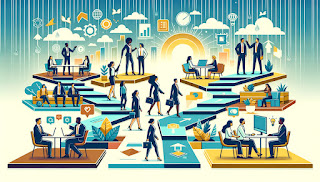How Education Is Important in Our Life
Education is one of the most powerful tools that shape individuals, societies, and nations. It is the foundation upon which personal growth, economic development, and social progress are built. Education is not just about acquiring knowledge from books; it also enhances our ability to think critically, make informed decisions, and contribute positively to society. This article explores the significance of education and how it impacts various aspects of our lives.
1. Education Enhances Knowledge and Skills
The primary role of education is to impart knowledge and develop skills. Through structured learning, individuals gain expertise in various subjects such as mathematics, science, language, and social studies. Education equips us with the tools to analyze situations, solve problems, and develop new ideas. In today’s rapidly changing world, the greater scope of education helps individuals adapt to new challenges and embrace technological advancements.
2. Education Promotes Personal Growth and Confidence
Education plays a crucial role in building self-confidence. When individuals acquire knowledge and skills, they become more self-reliant and capable of handling different situations in life. It fosters creativity, enhances communication skills, and helps individuals express their thoughts and ideas effectively. An educated person is more likely to make informed choices, whether it concerns career, health, or personal development.
3. Education Opens Career Opportunities
A good education increases employment opportunities and paves the way for a successful career. Employers seek individuals with the right qualifications and skills, and education provides the necessary training to excel in various professions. Higher levels of education often lead to better-paying jobs, financial stability, and job security. Furthermore, education encourages entrepreneurship by equipping individuals with the knowledge and confidence to start their own businesses.
Read More: Top Reasons Showing Importance of Education in Life
4. Education Contributes to Economic Growth
An educated workforce is essential for the economic growth of a nation. Countries with higher literacy rates experience greater economic development, as educated individuals contribute to innovation, productivity, and efficient use of resources. Education reduces poverty by providing individuals with better job prospects, enabling them to support their families and improve their standard of living. Moreover, educated societies are more likely to adopt sustainable development practices, ensuring long-term economic stability.
5. Education Promotes Equality and Social Harmony
Education plays a key role in reducing social inequalities and promoting inclusivity. It provides equal opportunities for people regardless of their background, gender, or socioeconomic status. Education empowers women and marginalized communities, helping them break free from social and economic barriers. When people are educated, they are more aware of their rights and responsibilities, leading to a more just and equitable society.
6. Education Fosters Innovation and Technological Advancement
Innovation and technological progress are driven by education. Scientists, engineers, and researchers use their education to develop new technologies, medical advancements, and solutions to global challenges. Education enables critical thinking and encourages individuals to question existing ideas, leading to discoveries and improvements in various fields. In the digital age, education in science, technology, engineering, and mathematics (STEM) is particularly important for driving future advancements.
7. Education Encourages Civic Responsibility and Global Awareness
Educated individuals are more likely to participate in civic activities, including voting, volunteering, and community service. Education fosters awareness of global issues such as climate change, human rights, and social justice. It encourages people to be responsible citizens who contribute positively to society. Additionally, education helps people understand different cultures, promoting tolerance and global cooperation.
8. Education Improves Health and Well-being
There is a strong link between education and health. Educated individuals are more likely to adopt healthy lifestyles, make informed medical choices, and access healthcare services. Education raises awareness about the importance of nutrition, hygiene, and disease prevention. It also helps reduce child mortality rates and promotes maternal health. Studies have shown that higher education levels lead to longer life expectancy and overall well-being.
9. Education Builds a Stronger Society
A well-educated society is the foundation of a prosperous nation. Education reduces crime rates, as individuals with better education are less likely to engage in illegal activities. It also promotes tolerance, understanding, and unity among people from different backgrounds. When individuals are educated, they contribute positively to society by supporting policies that promote peace, justice, and human rights.




Comments
Post a Comment